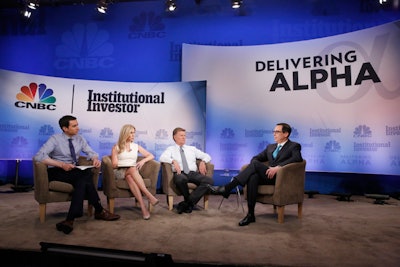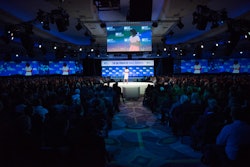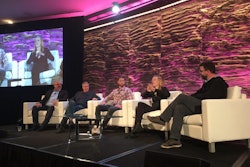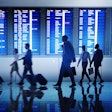
Since launching its first live event in 2011, CNBC has gradually made events a primary focus along with its TV, digital, and social coverage. Last week the network announced it will launch three new event series this spring, and plans to double down on its live event lineup year-over-year.
The new events, each targeted to a subset of CNBC’s business-minded audience, include the New York- and Washington-based Capital Exchange, a breakfast series featuring lawmakers, C.E.O.s, and administration officials about how business and government can collaborate to create jobs and economic growth; @Work, a New York-based three-part, half-day event series about workforce needs, productivity, and "the future of financials in the workplace"; and the Los Angeles-based Disruptor50 Road Show, a series of half-day regional summits celebrating the companies named to CNBC’s annual Disruptor50 list.
Jonathan Meyers, general manager and senior vice president of CNBC Events, recently spoke to BizBash about the network’s decision to invest more in events, the inspiration behind the new event series, and what the network is hoping to achieve as it continues to grow its event portfolio.
Why did CNBC decide to double down on its live events this year?
It’s largely due to such an overwhelmingly positive response from attendees and sponsors of our existing events. We’ve been doing events for eight years now—this will be our eighth year of the Delivering Alpha conference, which convenes an audience of some of the most influential people on Wall Street. The feedback we got from Delivering Alpha attendees helped us really recognize our competitive advantages in the live event space that make our events truly special. We do live events every day on TV, and we incorporate a lot of the same attributes into our live events. Our shows are hosted in venues that adhere to content you’re seeing on TV, and we have globally renowned talent whose job it is to elicit insights from guests we have on every week. And we also have high production value. We’ve been able to, quite successfully, move those advantages into the live event space.
What was the inspiration behind the three new event series CNBC is launching this spring?
The mission of CNBC Events is to convene valuable audiences to get insights from some of the greatest thought leaders in the world on all things money. We’re pretty deliberate in looking at the most loyal audiences of our digital and TV platform and making sure we have events or event series that would be of interest to each one of them.
@Work focuses on some of the most talked about topics right now. It’s a three-part series focused on how to build and manage a successful workforce amid our rapidly evolving technological landscape. Each event in the series will focus on a unique subsect of the workforce: Talent @Work is geared toward human resources officers, Productivity @Work is geared toward chief information officers and chief technology officers, and Capital @Work is geared toward chief financial officers and senior financial managers.
Moving on to Capital Exchange, we feel like we can add a lot of value by convening business leaders and policymakers in the government to have a dialogue, and create a better outcome for both businesses and citizens. That’s the goal of Capital Exchange, which will be a regular series that will grow to be monthly over time.
The Disruptor50 list, which we started five years ago, anoints the 50 most disruptive companies in the world, including little start-ups all the way up to the largest, most well-known start-ups in the world like Spotify and Lyft. As we were thinking about how to best serve the entrepreneurs that watch CNBC, we came across the idea of gathering the founders of all these disruptor companies and putting them to work. We asked if they could go on the road with us to pay it forward and share some of their insights on the lessons they learned. The Disruptor50 Road Show is a great example of something that CNBC digital and TV have created excitement around, and now can create an exciting event for those entrepreneurs and business owners.
What are some signature elements of a CNBC event?
We want the venue to be part of the experience. We’ve held events in venues such as classic car museums and modern art spaces. We try and make sure that the surrounding reflects the ethos of the event. The first appealing aspect should be your surroundings.
The next aspect is production value. We want it to be a really great, high-quality experience. We want to make sure our audience’s experience is high quality and conveys the premium aspect of our brand, and therefore an extension of how we want them to perceive CNBC. We are very careful to spend where we need to, to make sure it’s an event where people walk away excited.
It’s also what’s on stage. We convene 1,000 guests a week on TV. We have amazing access to business, thought, and opinion leaders from around the globe. Our agendas are unparalleled. The way we craft the sessions, be it the variety, pace, or tenor, is reminiscent of what we do on TV and keeps the event lively and engaging. We want to get the most in at each of the sessions we host.
The last thing is the fact that we’re broadcasting from the event. It’s very exciting to walk into an event and see the CNBC TV set up right in the middle of a networking area. There are many attendees who are really excited to see how CNBC TV is produced. The attendees get to interact with talent they watch every day, and be up close and personal with speakers.
[PULLQUOTE]
Are you integrating technology into live events in any unique ways?
On the most basic level, we try and integrate mobile and social into every event. At a past event, we had an awkward line [at the end of a session] where people congregated to ask questions on a microphone. Now we do our Q&As over social so people can tweet their questions. We show them onstage so you can see who tweeted the questions. It enables a more modern, seamless experience. We also do demos on stage. We’re looking to use virtual-reality headsets for everyone in the audience so they can experience a demo in real time, particularly around the @Work event series. You’ll see good use of technology at that event.
Do you expect the new events to be profitable?
We’re fortunate to have launch sponsors for each event, and we anticipate adding several new sponsors to each. We work under category exclusivity and we make sure sponsors have a lot of breathing room. From the onset, all our events are modeled out to be profitable with launch sponsors. When events are sold out to capacity, it creates a healthy business for CNBC. We put a good amount of that profit back into the event to create premium experiences that add extra value for attendees. For example, we’re launching Capital Exchange with CFA Institute and Nasdaq. Each sponsor at the event will have unique activations that enable them to create content aligned with the event, and show off unique products and services.
Do you have any other key markets you’re targeting besides New York, Los Angeles, and Washington?
The location of the event is by virtue of the subject matter. That’s largely how we select markets we go to. Los Angeles has a large and growing entrepreneur scene and is underserved in terms of infrastructure. The day after the Disruptor50 list is announced this year on May 22, we’ll convene the first Disruptor50 Road Show event in Los Angeles. The tour will move to Philadelphia in the fall and in the coming years it will be at SXSW [in Austin, Texas] and grow in frequency and in size. Los Angeles and Philadelphia are both hot markets for entrepreneurs where we felt like we could add value. We’re also going to be in San Francisco this year. Every year we have an event that honors the company that we named on the Disrupt 50 list. We bring the founders and key executives to enable them to network. It’s a very intimate and exciting event.
Can you tell me a little bit about the CNBC Events team?
We were fortunate to have built a great team that is a fully functioning events team. We have amazing leaders in sales and marketing, editorial, production, and audience development. Each has built out teams that will enable us to do close to 25 events this year. We’ve roughly doubled the team size year over year. We’re continuing to grow with three open positions. We also have the amazing advantage of being a TV production company. On March 28, we’re hosting our first-ever healthcare conference, Healthy Returns, in New York. Our team will not be the only people from CNBC there. Other producers from TV will be involved. We’ll have maybe 40 people from CNBC helping architect various aspects. We have that advantage of all the amazing talent that helps produce live events on TV every day.
Ultimately, what are you hoping to achieve with these new events?
Our goal is to build more loyalty with our valuable audience and sponsors. Events are a very unique space, in the sense that the intersection of business leaders today—both C-Suite executives and millennials—is pretty divergent. Events are the one common aspect. Both groups are excited to attend events, and experiential is a common area of passion and interest. We are very excited to continue to grow in the event space and excited to build loyalty with that audience.
This interview has been edited and condensed.



















